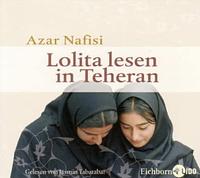You need to sign in or sign up before continuing.
Take a photo of a barcode or cover
Nafisi is a professor of English literature who resigned from her position in a Tehran university as a protest against increasingly repressive policies. Then she gathered together seven of her female students into a reading group, meeting regularly to read and discuss classics of Western literature, including Austen, James, Fitzgerald, and Nabokov, intending to "consider...how these great works of imagination could help us in our present trapped situation as women." The result is a skillful mixture of social commentary, memoir, and literary criticism.
Nafisi weaves back and forth among the strands of her university life, the events of Iran's cultural revolution, and the lives and thoughts of the students in the book group. A particularly compelling section presents a mock trial at the university in which Nafisi defends [b:The Great Gatsby|4671|The Great Gatsby|F. Scott Fitzgerald|http://photo.goodreads.com/books/1273944449s/4671.jpg|245494] against accusations of Western decadence and irrelevance. I've read a number of reviews on Amazon accusing Nafisi of not presenting the whole picture, but really, it's a memoir, not a history, and for me at least, it succeeded quite well as that.
Nafisi weaves back and forth among the strands of her university life, the events of Iran's cultural revolution, and the lives and thoughts of the students in the book group. A particularly compelling section presents a mock trial at the university in which Nafisi defends [b:The Great Gatsby|4671|The Great Gatsby|F. Scott Fitzgerald|http://photo.goodreads.com/books/1273944449s/4671.jpg|245494] against accusations of Western decadence and irrelevance. I've read a number of reviews on Amazon accusing Nafisi of not presenting the whole picture, but really, it's a memoir, not a history, and for me at least, it succeeded quite well as that.
slow-paced
informative
inspiring
reflective
sad
medium-paced
emotional
informative
reflective
slow-paced
challenging
hopeful
informative
inspiring
reflective
medium-paced
"Una volta che il male viene, come dire, personalizzato, ed entra dunque a far parte della vita quotidiana, la strategia per resistervi diventa anch'essa personale, individuale. In che modo l'anima riesce a sopravvivere? è la domanda essenziale. E la risposta è: con l'amore e la fantasia."
Trovo che sia difficile recensire un libro del genere.
L'autobiografia di Azar Nafisi, professoressa di letteratura inglese dell'Università di Teheran, racconta della sua professione, del distanziamento forzato (= forzato per continuare a vivere in libertà) dalla terra iraniana e del suo affetto per le sette ragazze che fanno parte dei suoi seminari/incontri segreti.
Questo libro è una poesia di amore per la letteratura, che è ribellione.
Lottare contro le oppressioni con la fantasia e la letteratura, che danno coraggio e rappresentano la resistenza.
Le parti in cui parla dell'intimità creatasi tra Azar e le sue studentesse l'ho trovata confortante e incoraggiante. At least they were together, girls fighting together. Ho trovato strazianti le parti in cui racconta cosa significa essere una donna nella Repubblica Islamica dell'Iran durante le guerre del 1980. Racconta di come le donne non sono libere di cantare, di seguire lezioni all'università.
Non possono scegliere che colori indossare e chi amare, non possono sciogliersi i capelli perché è punibile, con il carcere o con la morte. E se finiscono in carcere, le opzioni sono due: uccise tramite stupri e violenze fisiche, o, decapitate perché se vergini finiscono in paradiso.
Difficile da leggere, ma doveroso.
Voglio aggiungere che ho usufruito del libro come supporto, in realtà ho ascoltato l'audiolibro, che consiglio a chi si vuole approcciare a questa lettura, perché ha reso meno pesanti le parti monotone e ripetitive del racconto.
In generale, ho trovato l'esperienza di Azar e delle ragazze ispiratrice, da leggere per conoscere.
Trovo che sia difficile recensire un libro del genere.
L'autobiografia di Azar Nafisi, professoressa di letteratura inglese dell'Università di Teheran, racconta della sua professione, del distanziamento forzato (= forzato per continuare a vivere in libertà) dalla terra iraniana e del suo affetto per le sette ragazze che fanno parte dei suoi seminari/incontri segreti.
Questo libro è una poesia di amore per la letteratura, che è ribellione.
Lottare contro le oppressioni con la fantasia e la letteratura, che danno coraggio e rappresentano la resistenza.
Le parti in cui parla dell'intimità creatasi tra Azar e le sue studentesse l'ho trovata confortante e incoraggiante. At least they were together, girls fighting together. Ho trovato strazianti le parti in cui racconta cosa significa essere una donna nella Repubblica Islamica dell'Iran durante le guerre del 1980. Racconta di come le donne non sono libere di cantare, di seguire lezioni all'università.
Non possono scegliere che colori indossare e chi amare, non possono sciogliersi i capelli perché è punibile, con il carcere o con la morte. E se finiscono in carcere, le opzioni sono due: uccise tramite stupri e violenze fisiche, o, decapitate perché se vergini finiscono in paradiso.
Difficile da leggere, ma doveroso.
Voglio aggiungere che ho usufruito del libro come supporto, in realtà ho ascoltato l'audiolibro, che consiglio a chi si vuole approcciare a questa lettura, perché ha reso meno pesanti le parti monotone e ripetitive del racconto.
In generale, ho trovato l'esperienza di Azar e delle ragazze ispiratrice, da leggere per conoscere.
dark
emotional
informative
sad
slow-paced
I just couldn't. I had read few of the ones the author mentioned.
challenging
informative
reflective
sad
tense
medium-paced
challenging
slow-paced




